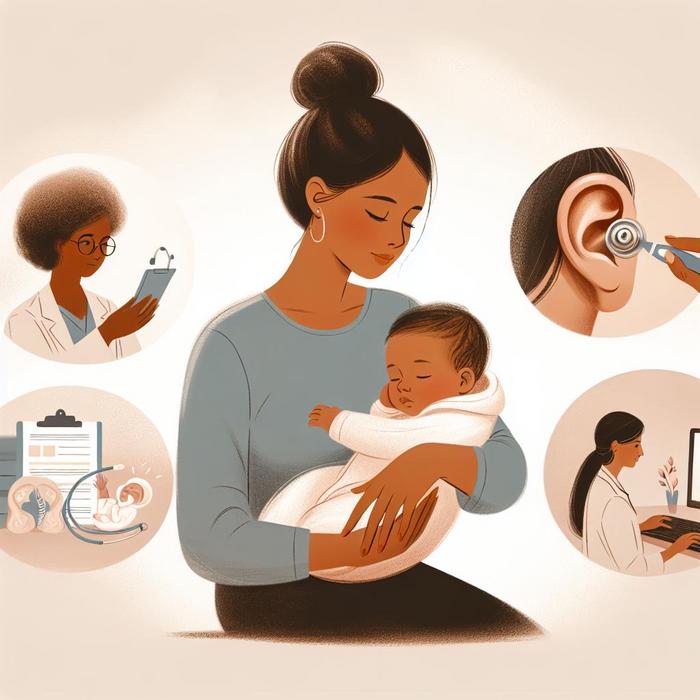Recognizing the Signs of a Baby Ear Infection
When it comes to your baby’s health, it’s crucial to be aware of the early symptoms of common conditions like ear infections. In this post, we are going to discuss how to recognize baby ear infection symptoms, offering you the knowledge to act swiftly when necessary.
Identifying Baby Ear Infection Symptoms
Since babies can’t voice their discomfort, recognizing an ear infection can be tricky. However, by paying attention to your baby’s behavior, you can detect signs that suggest an infection.
- Unusual irritability or fussiness
- Difficulty sleeping
- Frequent tugging or pulling at the ears
- Fluid drainage from the ear
- Balance difficulties
- Fever (particularly in infants and younger children)
If your baby exhibits any of these symptoms, it’s advisable to consult your pediatrician immediately. They can conduct an examination to determine if your baby has an infection and guide you on the next steps. Also, it’s crucial to be aware of these symptoms when managing other aspects of your baby’s health, such as food sensitivities or general discomfort.
Understanding Treatment Options for Baby Ear Infections
Once a baby ear infection is confirmed, your pediatrician will discuss treatment options with you.
- Observation: Mild infections often resolve on their own. Pediatricians may suggest observation for 48-72 hours. During this period, pain relief can be managed with over-the-counter pain relievers suitable for infants, as recommended by the pediatrician.
- Antibiotics: For severe or persistent infections, antibiotics may be prescribed. Ensure that the course is completed as instructed by the pediatrician, even if your baby seems better, to fully eradicate the infection.
Preventing Future Baby Ear Infections
As the old saying goes, prevention is better than cure. You can take several proactive steps to minimize the risk of future ear infections in your baby.
- Practice Good Hygiene: Regular hand washing can prevent the spread of bacteria and viruses that cause ear infections.
- Avoid Smoke Exposure: Secondhand smoke can increase the risk of ear infections in babies. Try to keep your baby’s environment smoke-free.
- Promote Healthy Eating: A balanced diet boosts the immune system. If you are introducing solids, take into account your baby’s possible food sensitivities while ensuring nutritional diversity.
Final Thoughts
Recognizing the signs of a baby ear infection, understanding treatment options, and preventing future infections are all crucial aspects of maintaining your child’s health. Remember, when in doubt, always consult your pediatrician.
Understanding the Cause of Baby Ear Infections
Just like adults, babies can develop ear infections due to viruses or bacteria, leading to fluid build-up in their middle ear. Their Eustachian tubes, which vent and drain the area behind the eardrum, are smaller and more horizontal than in adults, causing fluid to be trapped easily. This leads to an increased susceptibility to infections.
Understanding these factors is key in predicting potential onsets of ear infections.
Types of Baby Ear Infections
Baby ear infections are broadly categorised into three primary types:
- Acute Otitis Media (AOM): The most common baby ear infection, AOM, involves infection and inflammation in the middle ear, causing swelling and pain. If left untreated, AOM can lead to more severe conditions, such as mastoiditis.
- Otitis Media with Effusion (OME): Following an ear infection or eustachian tube dysfunction, fluid may accumulate in the middle ear, even without signs of infection – a condition called OME.
- Chronic Otitis Media with Effusion (COME): When fluid remains in the ear for a long time or repeatedly accumulates, it leads to COME, increasing the chances of an ear infection.
You can find more in-depth information regarding these baby ear infections on www.cdc.gov.
When Should You Seek Medical Attention?
It’s crucial to pay close attention to your baby if they start showing ear infection symptoms. Any delay in treatment can lead to severe complications like hearing loss or the infection spreading to other parts of the ear.
Follow these general guidelines on when to contact a healthcare professional (source):
- Contact your pediatrician immediately if your baby is less than six months old and is exhibiting signs of an ear infection.
- If your child is in pain, has a high fever, or if their symptoms persist for a few days, seek medical help.
Remember, it is better to be safe than sorry, and no question or concern is too trivial when it concerns your baby’s health.
The Potential Complications
Ear infections can potentially lead to severe complications if not treated promptly, as explained by the Cleveland Clinic. These include:
- Hearing Loss: Persistent fluid in the middle ear and chronic ear infections may lead to temporary or permanent hearing loss.
- Speech and Development Delays: Continued hearing loss may lead to delays in speech, social, and developmental skills.
- Spread of Infection: The infection can spread to other areas near the ear, including the brain.
In conclusion, it’s essential to observe your baby’s behavior and note any changes. Recognizing the signs of a baby ear infection, understanding treatment options, and preventing future infections are all crucial aspects of maintaining your child’s health. Remember, when in doubt, always consult your pediatrician.
